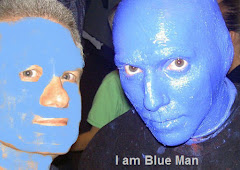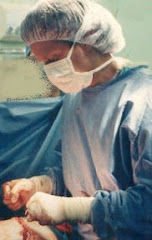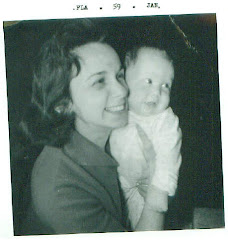And sometimes they just walk in, a bit weak, with a migraine like headache...
Neurology always amazes.
Often nothing when presenting as severe.
Less often, life changing when presenting as minor.
Blogging the trek of an non-traditional, older dude through a traditional physician educational process in a non-traditional world. Some people go out and buy a muscle car for their midlife crisis (I miss my '70 Camaro), but I decided to go to medical school. It is in God's hands and it's a RUSH.
And sometimes they just walk in, a bit weak, with a migraine like headache...
Neurology always amazes.
Often nothing when presenting as severe.
Less often, life changing when presenting as minor.
I've worked for more health care organizations than I care to remember or admit to. But while the traditional world of "gold watch" retirement scoffs at the notion of changing employers, I have found it as instructive to my professional and personal life as anything I've done including graduate school. This has been most instructive in the area of leadership and management of those organizations; The ones ostensibly directed at taking care of people. As long as those people aren't employees.
Now I certainly don't want to dismiss all health care organizations as insensitive to the people who work for them, they aren't. But there are many in the ranks of healthcare who are. And more importantly, those who believe that such treatment should be the norm. This is particularly true of larger organizations who become too large for management to comfortably adjust sensitivity into the mix. In many cases it seems that such management is part of the training of healthcare managers who see employees as little more than worker ants in their "hill", or line-up.
Every once in awhile I run into an organization that breaks the mold. One that specifically addresses the gap between employer and employee in an active, specific and dynamic way. I'm so relieved to have experienced Inclusive Management and Leadership - A type of management that deliberately includes all members of the team in the evaluation of the past, execution of the present, and planning for the future. Wow! What a concept!!
So what does that look like? I was standing at the physician's desk, working up a patient's chart and the lead physician walked over, called everyone over and created an "instant meeting" over a particular issue he needed immediate input on. I likened it to a soccer team huddle right before kick off (flashback to my goal-keeper days). An instant meeting, including everyone (including the clean up crew) to address a specific situation, and plan for the future. Can't get any more inclusive than that. Everyone had input, and everyone walked away from those few minutes feeling like they had a voice and part of the organization.

This is a really enjoyable place to work. Everyone knows the failures and shares in the successes. Opposing points of view are appreciated and encouraged and never end up in contention, firings or retribution. Everyone has value in the working of the practice and becomes an "expert" to consult in their area. There are meetings and huddles, with the time and space to be sure that all elements of opinion are worked out and implemented as necessary. Management is about finding the resources to implement ideas not about creating top-down decisions. The lead physicians and managers are always available 
I can't tell you how refreshing this type of health care environment is and how happy the sick patients seem to be as a result. They really enjoy coming here.
Her points and challenges:
It's important to "embrace the breath-stealing terror that comes with knowing you are it." Now that's not a reality for residents starting out, but there is no turning back into the comfort of student rotations where, one preceptor told me, "we don't depend on you for anything except to show up." There is a certain fear that comes with increasing responsibility and I see it just over the horizon. It's different than operating as a dependent anything.
She relates that we should "doubt decisions you never doubted, and invent questions you never had". It seems that the more I learn, the more I know, the more I question. It seems to be grounded in "the more I know, the more I don't know" phenomenon. I seem to ask questions now that I've never asked before, and likely I should have.
Forner instructs the reader to "go back to the basics". This seems to be a haunting task given the enormity of the core of basic sciences that contributes to what we do every day. It seems that many around me attempt to make the practice of medicine more complicated, or more likely, they are inspired to do so by laws, rules, guidelines, directives, legal decisions, risk, liability and on, and on, and on. There seems to be a fine balance between practice that honors the basics and the addition of complexity that has become the practice of medicine.
While there is the tendency to go it alone, Dr. F encourages asking for help. It's so fortunate that the source of help has really expanded and I'm grateful for learning how to use them. There is so much information on my smart-phone, on my Kindle Fire, on my laptop in the online world...there is no reason not to check, ask, and test theory with database information of experts. I've become a devotee of "Up to Date" and other sources of quality information. I think I've matured a bit from my Wiki-medical-school approach to "asking for help".
Much of what we do depends on others. Medicine is a team sport, whether you want to be on the same team or not with the person you stand with. It is extremely important to "understand the value of knowing the people with whom you work". Much of what we end up doing in practice is dependent on the actions or inaction of others. I've seen that time and time again as a PA. I'm sure it'll be more clear and important as a resident. It's important to regularly identify those you can depend on to assist you when you need it most. Those reliable sources of guidance, direction, support and lead can make or break your practice.
As in life, medical practice is based on discernment and knowing what you know when you know it. She points out that it's possible that you may "actually know more than some of your older, more experienced colleagues". Being old may limit application of that perspective in my case, but I'm hopeful. I know I won't stand back "out of quiet respect" but I hope I recognize what I do know, and what I don't know. That speaks to "trusting instincts and listening to them". But then, that inspires great fear at times too.
Her last point speaks to "wanting to teach." This is easy for me. I believe that (as one supervisor once told me) I shouldn't "die with knowledge not passed on" to others coming behind me. For me too, teaching is a learning tool and I need to get ready for a few more exams before this process is all over. I have much to teach and much more to learn. And even in the fear, it's exhilarating to be moving forward into the abyss.
Thanks to Dr. F, I have more rappelling gear to get out and use.
Graduation is coming. I can see it. I can taste it. I can feel it. There are few of us left who started this trek together, both faculty and students.
Who knew it would look, taste and feel so good.
2 more months, officially, and my folks will be able to say "my son the smiley face doctor". Whew!




